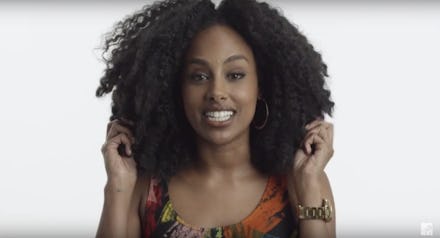Women of Color Point Out the Big Problem With White Beauty Standards

Beyoncé put white beauty standards on blast in "Sorry," a track from her latest album Lemonade, when she sang, "You better call Becky with the good hair." The reference went over more than a few people's heads, with Glamour running a tone deaf piece last month titled "Things you only know if you're called Becky and you have good hair," and Iggy Azalea missing the point by thinking the term "Becky" is racist.
In a video for MTV News, five women of color broke down the way whiteness informs expectations for how all women should look.
"White beauty standards are when whiteness is the default and it becomes the cultural ideal for beauty," explains Danielle Henderson, writer and creator of Feminist Ryan Gosling. "What's wild is that if you're white you may not even see it because it's so pervasive."
Franchesca Ramsey, the host of MTV's Decoded series, comedians Rekha Shankar and Lily Du and New York-based makeup artist Delina Medhin name some of the most common features society tells women they must have in order to be considered beautiful.
"It's usually a slim nose ..." says Ramsey.
"... having light skin," adds Shankar.
"Big eyes, big lashes," says Du.
"... and having hair that's the exact opposite of mine," finishes Medhin.
Read more: Barack Obama Just Got Real About the Beauty Pressures Black Women Face Every Day
The women went through beauty staples like foundation, face powder and pantyhose that companies term "nude," but really only accommodate one skin tone — white. Some products, Ramsey, Shankar and Du showed, are even more explicit in their insistence on whiteness, like the skin-lightening product Fair & Lovely, marketed to Indian women, and eye tape meant for Asian women to give themselves a double eyelid.
"The problem is that all these social messages you get about what is and who is beautiful influences who you think is beautiful," says Henderson. "Representation matters and it matters because we can raise an entire generation of people who don't carry this cultural baggage with them."
Women of color are making huge strides in smashing some of these recurring tropes in the beauty industry. Fashion blogger Ofunne Amaka created an Instagram account to demonstrate how different makeup products look on women of color. And two Harvard students created a website to help women of color find "nude" clothing and accessories that match their skin tone.
Said Ramsey, "We have to see different representations of beauty and women of color and womanhood so that we can know that who we are is just fine."